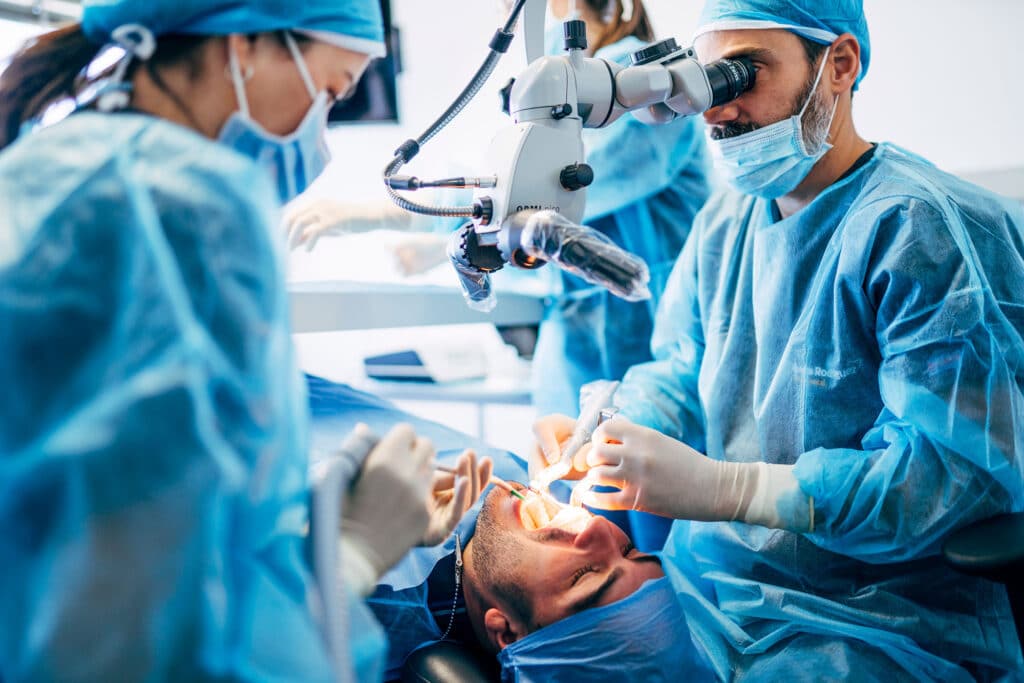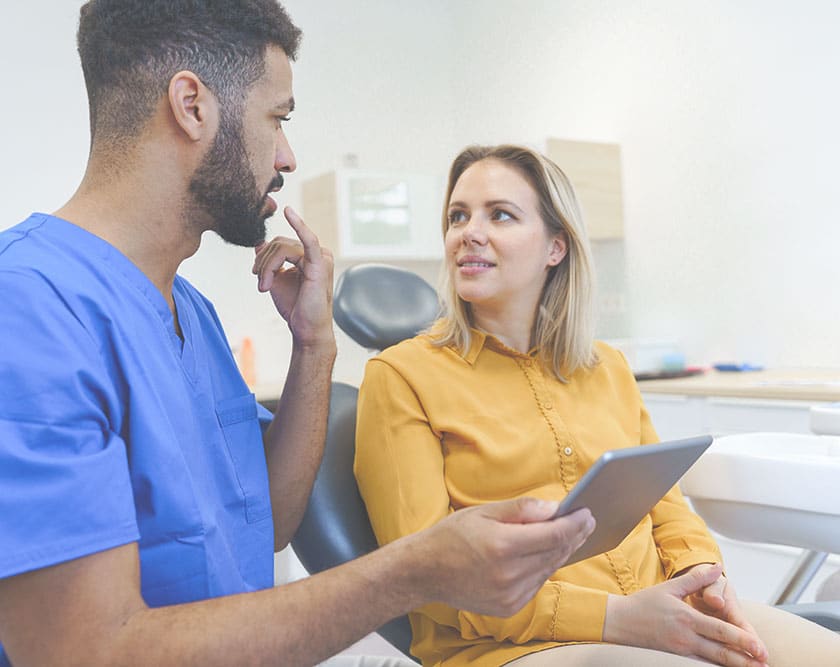What is oral surgery?
Nobody likes to hear the words “oral surgery” because they cause us to envision serious, invasive procedures and extended hospital stays. While we understand the concerns, oral surgery or maxillofacial surgery, are blanket terms that refer to a wide variety of dental procedures, of varying degrees. Oral surgery in Burlington includes many common procedures such as wisdom teeth removal, tooth extractions, dental implants and more. Most treatments are straightforward and simple, so don’t begin worrying because your dentist has used the term oral surgery.
Oral and maxillofacial surgery refer to a surgery that is performed on the tissues of your mouth. This includes your teeth and gums (oral surgery) as well as your jaw, head or face (maxillofacial surgery).
Our surgeons for oral surgery in Burlington have more than 20 years experience performing all varieties of oral surgery procedures, always putting our patient’s health and well-being first.

When might I need oral surgery?
You may be surprised to learn that oral surgery is a common part of modern dentistry. Most of us will undergo some type of oral surgery procedure in our lives, and the majority will be minor treatments.
Anytime an oral surgery procedure could be required, your dentist will provide an in-depth consultation or review and may refer you to an oral surgeon for treatment. This is because oral surgeons provide more specialized treatments and offer additional expertise. Depending on your specific diagnosis, it will be up to your dentist and oral surgeon to decide who can better perform the procedure.
Types of oral surgery offered by our Burlington oral surgeons
What can I expect from having oral surgery?
You’ve had a consultation with your dentist and oral surgeon which resulted in the decision to undergo oral surgery. Now you’re wondering what you need to know about the process and what information you’ll need to make arrangements before and after your treatment. Every patient and procedure are different, which is why your oral surgeon and dentist will go over everything you need to know during your consultation
Consultation
The first step regarding oral surgery is a consultation with your dentist or surgeon. This is where you can learn about the treatment process and any steps you’ll need to take both before and after the procedure is complete. Your surgeon will ask you about your medical history and current medications if applicable. You will also find out whether sedation is necessary for your treatment and if any medications or antibiotics are required.
Transportation Arrangements
During your consultation, you will be advised whether you will need someone to pick you up after the procedure. Most oral surgery procedures are outpatient surgeries and you’ll be discharged from our office shortly after completion. If you have undergone sedation for your procedure, you’ll need to have arranged for a way to get home as it may be unsafe for you to drive or take public transit. Elderly patients or those who have undergone extensive surgeries may be more comfortable having someone to take care of them for a day or two. You may also be required to pick up medications or antibiotics from a pharmacy for use after your treatment.
Eating and Drinking Before and After Your Procedure
Whether you are required to fast before your procedure will largely depend on the level of sedation that is necessary. General anaesthesia usually means you will be unable to eat or drink at least 8 hours before surgery, but the exact requirement will be advised by your surgeon during consultation. If you only require local anaesthesia you will be able to eat and drink before your procedure.
After your procedure, it may be difficult for you to eat hard foods. This will have been discussed during your consultation, but your dentist will temporarily put you on a soft food-only diet to avoid chewing or biting. Protein shakes, broths and soups are common alternatives and your blender might just become your best friend until you recover. It is important not to sip through a straw because the negative pressure can lead to complications like dry socket. Avoid alcohol for 24 hours after undergoing general anaesthesia and be very careful eating until you can feel your cheek and tongue after local anaesthesia.
Medications
During your consultation, you will be asked about your medical history and any medications you are currently taking. You may be asked to stop taking medications such as blood thinners weeks before your procedure, as these can extend the healing time. It is also a good idea to pick up any painkillers or antibiotics you’ve been prescribed before treatment, so they are ready for you when you get home. Some procedures may also require you to begin taking medication before your procedure date.
Preparing Your Home
Before you go in for surgery, it’s a good idea to get your home in shape for your recovery. Consider changing your bed linen to something clean and disposable and load up your bed or sofa with lots of pillows to comfortably elevate your head. Collect your necessities and place them nearby so all you have to do is sit or lay back and relax. Things to collect include reading materials, glasses, phones, TV remotes, painkillers, antibiotics, glass (pitcher) of water etc. It is also a good idea to stock up on or prepare some food and drink for you to consume during your recovery. Also, don’t forget to have some ice packs ready to go in case of swelling or pain. Asking someone you trust to be ‘on-call’ in case you need assistance can also really help take some worry off your mind.
What to Expect During Your Recovery
Every recovery process is different and depends on the individual or procedure. The large majority or patients will make a complete recovery and the pain or swelling should begin to subside in a couple of days. It is important to manage your symptoms and try to keep yourself comfortable. Remember to take any antibiotics or medications as prescribed and do not exceed recommended dosages. If pain, swelling, or bleeding persists it is important to get in touch with your surgeon or dentist.
Recovery Tips
Your surgery is completed and now you need to recover. You may be in pain and not having much fun, but remember, it will pass in a few days so try to relax and ride it out. If you’ve undergone general anaesthesia, you may feel drowsy and tired, so going home for some rest is the best idea. After surgery, you should treat your symptoms and use painkillers or other medications as directed. Try to eat (something soft or liquid) and stay hydrated so your body can do its best to heal quickly. Sleep with your head elevated for a few days to help reduce swelling and use cold compresses to help ease the associated pain. Unless otherwise instructed, you can typically begin rinsing your mouth with lukewarm salt water and possibly attempt to carefully brush and floss your teeth as early as 24 hours post-surgery.

Questions to ask your Burlington oral surgeon
How long does my oral surgery take?
Will I require sedation? If so, which type?
Am I required to avoid eating or drinking before my appointment?
Will I require a friend or relative to take me home after?

Financing Options & Direct Insurance Billing Available
Martindale Dental understands that the cost of dental procedures can be a significant concern for patients. To help alleviate this, we offer a range of financing options, such as flexible payment plans, to ensure patients can access the treatments they need. Moreover, we provide direct insurance billing, which simplifies the payment process and reduces out-of-pocket expenses for patients. By accepting insurance payments directly, patients can avoid the hassle of filing claims or waiting for reimbursements. With these financing options and direct insurance billing, Martindale Dental aims to make dental care more affordable and accessible to all patients, without compromising on quality.
